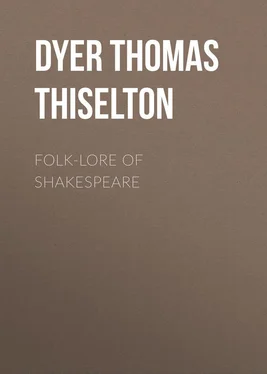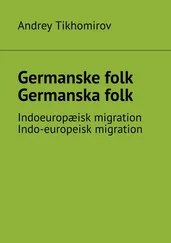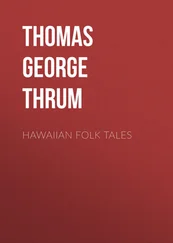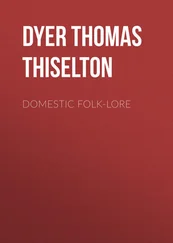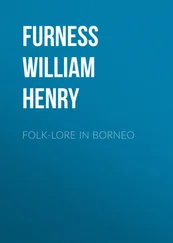Thomas Dyer - Folk-lore of Shakespeare
Здесь есть возможность читать онлайн «Thomas Dyer - Folk-lore of Shakespeare» — ознакомительный отрывок электронной книги совершенно бесплатно, а после прочтения отрывка купить полную версию. В некоторых случаях можно слушать аудио, скачать через торрент в формате fb2 и присутствует краткое содержание. Жанр: foreign_antique, foreign_prose, на английском языке. Описание произведения, (предисловие) а так же отзывы посетителей доступны на портале библиотеки ЛибКат.
- Название:Folk-lore of Shakespeare
- Автор:
- Жанр:
- Год:неизвестен
- ISBN:нет данных
- Рейтинг книги:4 / 5. Голосов: 1
-
Избранное:Добавить в избранное
- Отзывы:
-
Ваша оценка:
- 80
- 1
- 2
- 3
- 4
- 5
Folk-lore of Shakespeare: краткое содержание, описание и аннотация
Предлагаем к чтению аннотацию, описание, краткое содержание или предисловие (зависит от того, что написал сам автор книги «Folk-lore of Shakespeare»). Если вы не нашли необходимую информацию о книге — напишите в комментариях, мы постараемся отыскать её.
Folk-lore of Shakespeare — читать онлайн ознакомительный отрывок
Ниже представлен текст книги, разбитый по страницам. Система сохранения места последней прочитанной страницы, позволяет с удобством читать онлайн бесплатно книгу «Folk-lore of Shakespeare», без необходимости каждый раз заново искать на чём Вы остановились. Поставьте закладку, и сможете в любой момент перейти на страницу, на которой закончили чтение.
Интервал:
Закладка:
“Dismiss me. Enough!”
The spirit, likewise, in “2 Henry VI.” (i. 4) utters these words:
“Ask what thou wilt. That I had said and done!”
Spirits were supposed to maintain an obdurate silence till interrogated by the persons to whom they made their special appearance. 75 75 We may compare the words “unquestionable spirit” in “As You Like It” (iii. 2), which means “a spirit averse to conversation.”
Thus Hamlet, alluding to the appearance of the ghost, asks Horatio (i. 2):
“Did you not speak to it?”
Whereupon he replies:
“My lord, I did;
But answer made it none: yet once, methought
It lifted up its head and did address
Itself to motion, like as it would speak.”
The walking of spirits seems also to have been enjoined by way of penance. The ghost of Hamlet’s father (i. 5) says:
“I am thy father’s spirit,
Doom’d for a certain term to walk the night,
And for the day confin’d to fast in fires,
Till the foul crimes done in my days of nature
Are burnt and purg’d away.”
And further on (iii. 2) Hamlet exclaims:
“It is a damned ghost that we have seen.”
This superstition is referred to by Spenser in his “Fairy Queen” (book i. canto 2):
“What voice of damned ghost from Limbo lake
Or guileful spright wand’ring in empty ayre,
Sends to my doubtful eares these speeches rare?”
According to a universal belief prevalent from the earliest times, it was supposed that ghosts had some particular reason for quitting the mansions of the dead, “such as a desire that their bodies, if unburied, should receive Christian rites of sepulture, that a murderer might be brought to due punishment,” etc. 76 76 Douce’s “Illustrations of Shakespeare,” pp. 450, 451.
On this account Horatio (“Hamlet,” i. 1) invokes the ghost:
“If there be any good thing to be done,
That may to thee do ease and grace to me,
Speak to me.”
And in a later scene (i. 4) Hamlet says:
“Say, why is this? wherefore? What should we do?”
The Greeks believed that such as had not received funeral rites would be excluded from Elysium; and thus the wandering shade of Patroclus appears to Achilles in his sleep, and demands the performance of his funeral. The younger Pliny tells a story of a haunted house at Athens, in which a ghost played all kinds of pranks, owing to his funeral rites having been neglected. A further reference to the superstition occurs in “Titus Andronicus” (i. 1), where Lucius, speaking of the unburied sons of Titus, says:
“Give us the proudest prisoner of the Goths,
That we may hew his limbs, and, on a pile,
Ad manes fratrum sacrifice his flesh,
Before this earthy prison of their bones;
That so the shadows be not unappeased,
Nor we disturbed with prodigies on earth.”
In olden times, spirits were said to have different allotments of time, suitable to the variety and nature of their agency. Prospero, in the “Tempest” (i. 2), says to Caliban:
“Be sure, to-night thou shalt have cramps,
Side-stitches that shall pen thy breath up; urchins
Shall, for that vast 77 77 Vast, i. e. , space of night. So in “Hamlet” (i. 2): “In the dead waste and middle of the night.”
of night that they may work,
All exercise on thee.”
According to a popular notion, the presence of unearthly beings was announced by an alteration in the tint of the lights which happened to be burning – a superstition alluded to in “Richard III.” (v. 3), where the tyrant exclaims, as he awakens:
“The lights burn blue. – It is now dead midnight,
Cold fearful drops stand on my trembling flesh —
Methought the souls of all that I had murder’d
Came to my tent.”
So in “Julius Cæsar” (iv. 3), Brutus, on seeing the ghost of Cæsar, exclaims:
“How ill this taper burns! Ha! who comes here?”
It has been a widespread belief from the most remote period that ghosts cannot bear the light, and so disappear at the dawn of day; their signal being the cock-crow. 78 78 See p. 104.
The ghost of Hamlet’s father says (i. 5):
“But, soft! methinks I scent the morning air;
Brief let me be” —
and —
“Fare thee well at once.
The glow-worm shows the matin to be near,
And ’gins to pale his uneffectual fire:
Adieu, adieu! Hamlet, remember me.”
Again, in “King Lear” (iii. 4), Edgar says: “This is the foul fiend Flibbertigibbet: he begins at curfew, and walks till the first cock.”
The time of night, as the season wherein spirits wander abroad, is further noticed by Gardiner in “Henry VIII.” (v. 1):
“Affairs, that walk,
As they say spirits do, at midnight.”
It was a prevalent notion that a person who crossed the spot on which a spectre was seen became subject to its malignant influence. In “Hamlet” (i. 1), Horatio says, in reference to the ghost:
“But soft, behold! lo, where it comes again!
I’ll cross it, though it blast me.”
Lodge, in his “Illustrations of British History” (iii. 48), tells us that among the reasons for supposing the death of Ferdinand, Earl of Derby (who died young, in 1594), to have been occasioned by witchcraft, was the following: “On Friday there appeared a tall man, who twice crossed him swiftly; and when the earl came to the place where he saw this man, he fell sick.”
Reginald Scot, in his “Discovery of Witchcraft” (1584), enumerates the different kinds of spirits, and particularly notices white, black, gray, and red spirits. So in “Macbeth” (iv. 1), “black spirits” are mentioned – the charm song referred to (like the one in act iv.) being found in Middleton’s “Witch” (v. 2):
“Black spirits and white,
Red spirits and gray;
Mingle, mingle, mingle,
You that mingle may.”
A well-known superstition which still prevails in this and foreign countries is that of the “spectre huntsman and his furious host.” As night-time approaches, it is supposed that this invisible personage rides through the air with his yelping hounds; their weird sound being thought to forbode misfortune of some kind. This popular piece of folk-lore exists in the north of England under a variety of forms among our peasantry, who tenaciously cling to the traditions which have been handed down to them. 79 79 See Hardwick’s “Traditions, Superstitions, and Folk-lore,” 1872, pp. 153-176.
It has been suggested that Shakespeare had some of these superstitions in view when he placed in the mouth of Macbeth (i. 7), while contemplating the murder of Duncan, the following metaphors:
“And pity, like a naked new-born babe,
Striding the blast, or heaven’s cherubim, horsed
Upon the sightless couriers of the air,
Shall blow the horrid deed in every eye,
That tears shall drown the wind!”
Again, in “The Tempest” (iv. 1), Prospero and Ariel are represented as setting on spirits, in the shape of hounds, to hunt Stephano and Trinculo. This species of diabolical or spectral chase was formerly a popular article of belief. As Drake aptly remarks, 80 80 “Shakespeare and His Times,” vol. i. p. 378.
“the hell-hounds of Shakespeare appear to be sufficiently formidable, for, not merely commissioned to hunt their victims, they are ordered, likewise, as goblins,” to —
Интервал:
Закладка:
Похожие книги на «Folk-lore of Shakespeare»
Представляем Вашему вниманию похожие книги на «Folk-lore of Shakespeare» списком для выбора. Мы отобрали схожую по названию и смыслу литературу в надежде предоставить читателям больше вариантов отыскать новые, интересные, ещё непрочитанные произведения.
Обсуждение, отзывы о книге «Folk-lore of Shakespeare» и просто собственные мнения читателей. Оставьте ваши комментарии, напишите, что Вы думаете о произведении, его смысле или главных героях. Укажите что конкретно понравилось, а что нет, и почему Вы так считаете.
